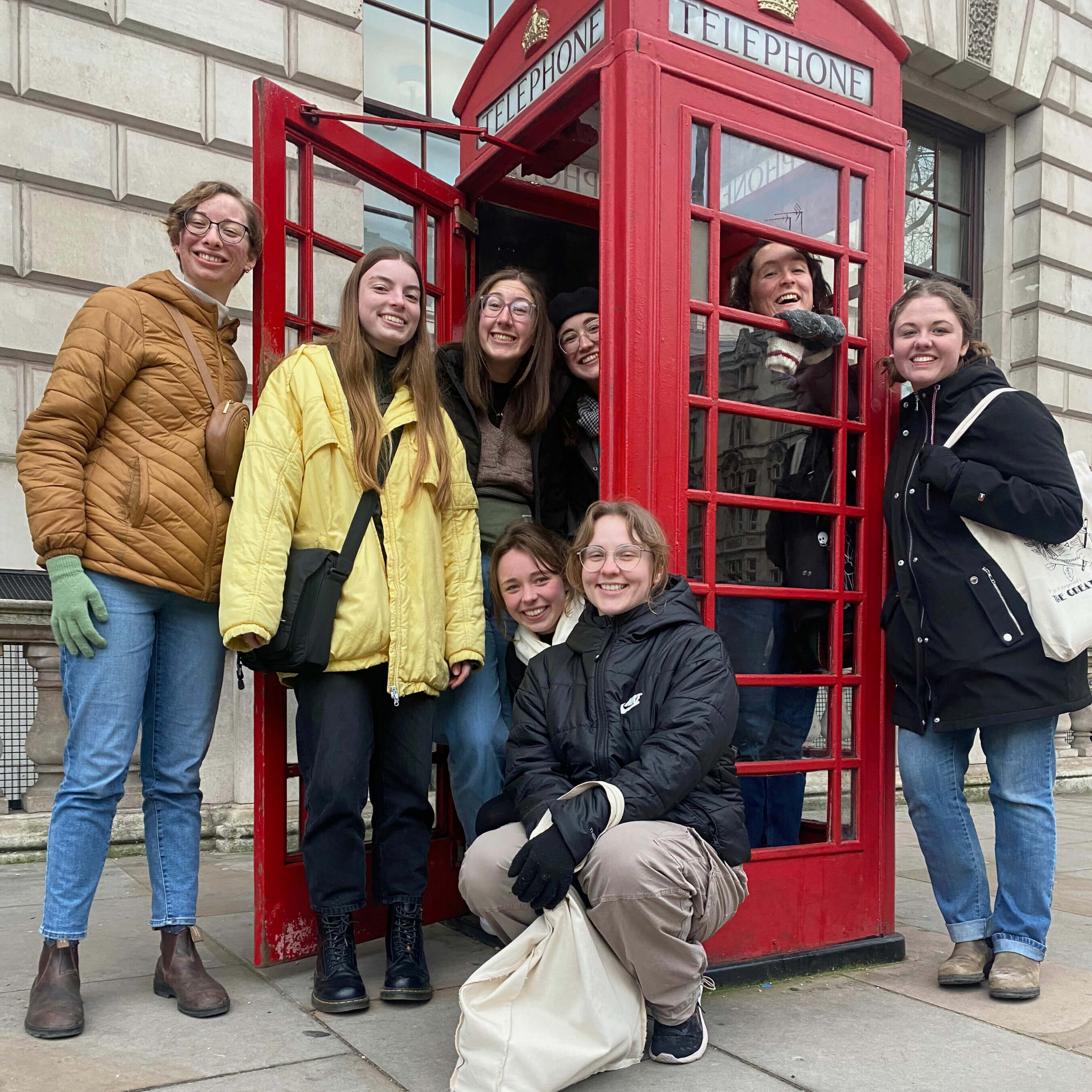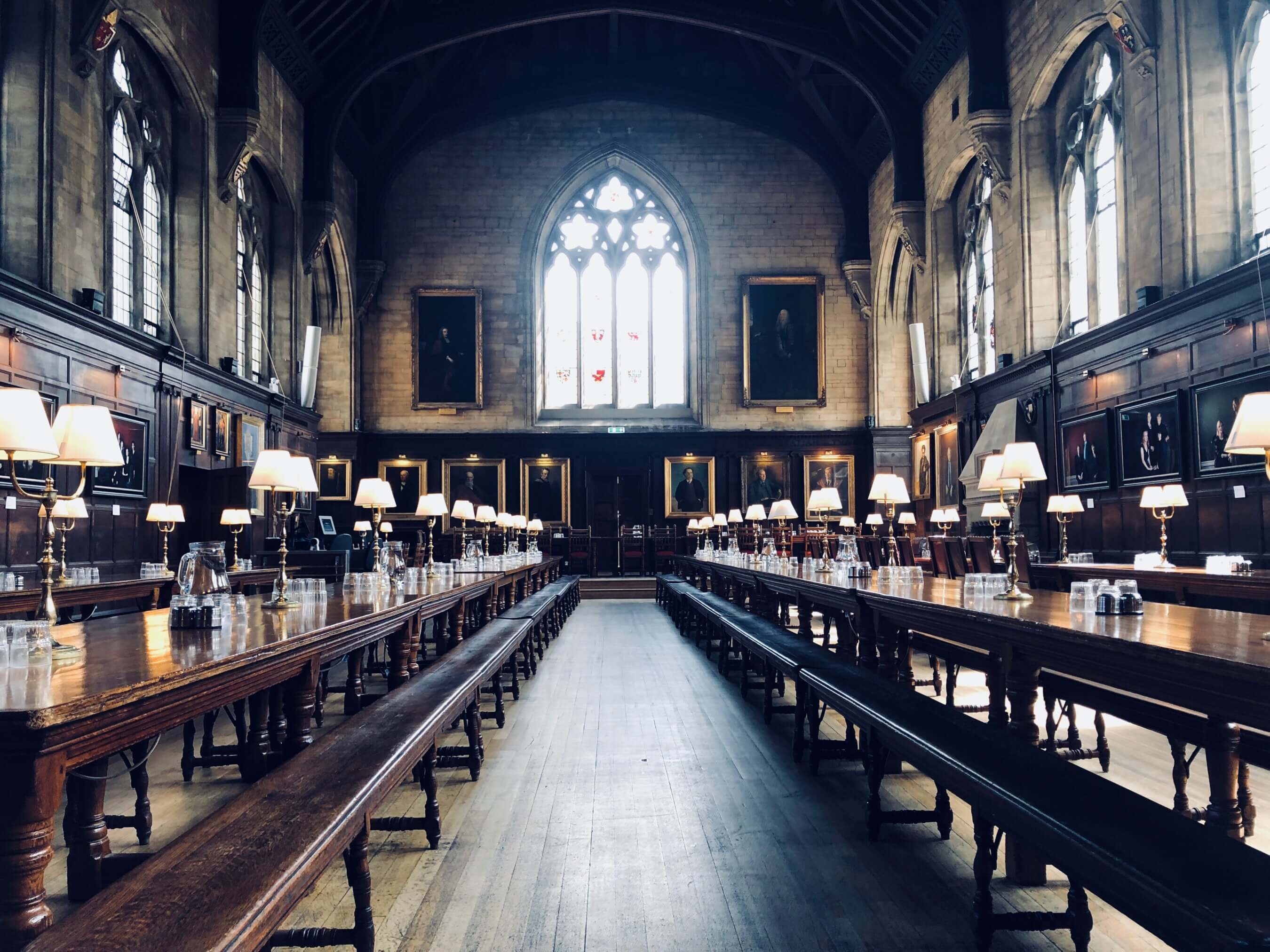You are on the train, sweeping through lush farmland and forests from the small hamlet of Charlbury. Ahead, you see the stone architecture of larger English towns. You peer out the window, your breath steaming on the glass, anticipation in your veins. And then you arrive at Oxford, the renowned academic institution where C.S. Lewis, J.R.R. Tolkien, John Wycliffe, Thomas Hobbes, Aldous Huxley, Felicity Jones and countless other writers, actors, state leaders, scientists and Nobel Prize winners have studied.

Several Redeemer students experienced this unique opportunity last year, as they travelled to England to participate in the Oxford Study Programme at Regents College—a hall in the University of Oxford. Among them were third-year English students Kathryn Wikkerink, Melissa Goossen and Erin Atsma, third-year history major Reanna Linde and fourth-year theatre major Rowena Hobbs.
In conjunction with Crandall University, a Christian institution in New Brunswick, the program has been offered at Redeemer since 2002, except for a hiatus during the COVID-19 pandemic. Faculty liaison Dr. Ben Faber, described it as an “intellectually challenging, culturally enriching and socially rewarding” experience for students whom faculty believe are “academically equipped, open to new experiences and can relate well with their hosts, instructors and fellow classmates.”
Though making the decision to study in another country away from friends and family can be a difficult one, last year’s Redeemer participants all had their hearts set on the program for some time.
For Wikkerink and Goossen, the program factored into their decision to attend Redeemer, while Atsma and Linde expressed that they had always wanted to experience living in a different country, with Linde having decorated her room with pictures of England since she was a child.
After taking part in the three-month program, where they billeted with families in rural Charlbury and studied at Oxford, the students expressed their appreciation for the program and opportunity.
Away from home, I learned to depend on God more. He was so near to me because so much [that I knew] had been stripped away.
“It was surreal,” said Goossen of studying in the large, posh libraries, while Linde noted that the experience was particularly special because such areas, with their intricate architecture and comfortable and sophisticated atmosphere, were only accessible to students—not the general public.
“A place like Oxford can be intimidating at first,” Atsma commented. But she too grew fond of the uniqueness of their opportunity and saw it as “something to take advantage of and make the most of.”
Reflecting on the academically intensive program, the students unanimously agreed that Redeemer had prepared them well for the transition. Wikkerink attributed this to Redeemer’s “small classes and high-level learning,” which was similar to their studies in Oxford, in which they, along with three Crandall participants, made up the entirety of their classes.
“Humanities readings and interactive classes like literary criticism really prepared me,” Hobbs noted. Content at Oxford took on interactive discussion forms and covered interrelated topics.
But more than just their academics, the program provided a chance to grow spiritually.
“When you get involved in something like this you realize the world is so big,” said Wikkerink. “You’re just one person. I had to step out of my comfort zone; it was a way of expanding that changed me in so many positive ways.”
Linde gained a new respect for herself with her newfound independence and ability to step into an unfamiliar setting while Atsma believed the unfamiliar situation was an opportunity to get to know herself better.

Hobbs echoed this sentiment. Being away in England for three months not only proved she could do something like this, but it profoundly impacted her faith. Studying in an academic institution that did not teach from a Christian worldview and sometimes even came into conflict with her beliefs, allowed her to “broaden her perspective” and strengthen her faith as she learned to engage with different ideas.
“I became more comfortable speaking and giving my thoughts in class. I had to see more common grace, in the fact that even if I didn’t agree with people, they still had some good points.”
This non-Christian aspect of academic instruction, combined with being far away from their regular lives and families made the participants seek God more intentionally.
“Away from home, I learned to depend on God more,” Wikkerink explained. “He was so near to me because so much [that I knew] had been stripped away.”
For Linde and Atsma, their connection to God came in the form of small moments, signs and answered prayers.
Atsma recalled the story of her arrival at her billeting house.
“I’ve always wanted a skylight above my bed. When the people billeting me showed me my room, I saw it had one and I was so excited. It was just a little way that God reassured me about my decision from the get-go.”
It’s a big opportunity for growth. It’s not necessarily easy; it puts you in a position to be challenged, vulnerable and unique. If you give a lot, you will get a lot.
Linde, who had been dealing with personal matters prior to departure, felt she was unconsciously “looking for some sign of confirmation from God.”
“In our orientation, a professor shared Oxford’s motto, which I hadn’t known: ‘The Lord is my light.’ That was kind of a spark showing me that I needed to stop coasting in my faith and draw closer to God while I was away.”
Goossen acknowledged people’s ability to slowly become desensitized to their new surroundings the longer they stay somewhere. She was determined to continually appreciate the season of life, something that kept her present in her pursuit of God.
“I prayed for the Lord to renew my awe, to teach me something new every day.”
With their positive takeaways a tribute to the success of the program, the young women hope to encourage others to embark on the journey that helped them grow academically and spiritually.
“It’s a big opportunity for growth,” Goossen commented. “It’s not necessarily easy; it puts you in a position to be challenged, vulnerable and unique. If you give a lot, you will get a lot.”
Hobbs believed the experience “rounds you out as a person and shows that if you take risks, God can do cool things,” while Wikkerink described the program as “the opportunity of a lifetime.”